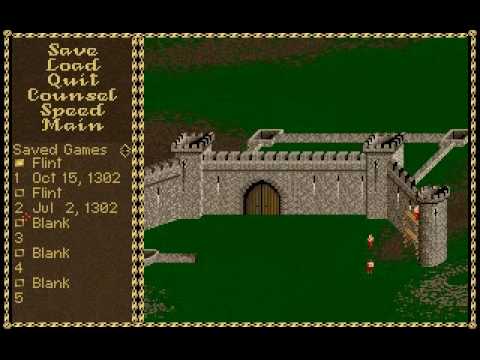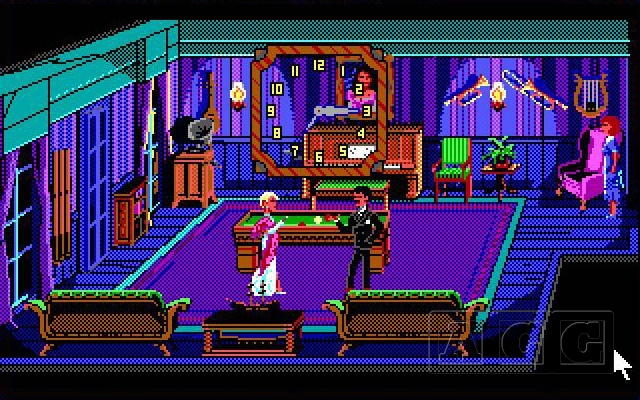Five Favourite Gaming “Period Pieces”


Sorry about the dust.
I’ve long been a keen student of history, though far less in the classroom than in my own leisure time. You’re more likely to find me reading non-fiction than fiction, despite my love of the sci-fi and fantasy genres. I couldn’t really offer a concrete reason why…perhaps the knowledge that these factual stories and characters are real make them more tangible, or surprising.
It was recently during a search for a book about the Plantagenet kings or the Hundred Years’ War or some other matter that I paused to reflect how this particular interest has had an impact on my enjoyment of another of my passions: video games. Certainly, the science fiction and fantasy arenas, together with other whimsical settings would constitute the majority of the gaming experiences I’ve had. Games are, in my view, primarily an escape, and I don’t think it’s any coincidence that mystical or far-flung words are such popular destinations. That said, “real world” stories and settings, whether an over-the-top take like Grand Theft Auto or a game grounded in day to day tasks like Heavy Rain also have their appeal. To me, games that manage to blend an accurate, evocative historical setting with an interesting story are a special sort of journey.
World/Ancient history is well represented in the strategy genre, particularly with regards to military history – I sunk many hours into Ancient Art of War or Civilization. The first-person shooter has greatly increased my understanding of WW2 in general, or at least my interest in extra-curricular reading or viewing on the subject. I even have fond memories of exploration games like Seven Cities of Gold or over-looked adventure titles like Gold Rush that make great efforts to be historically genuine. I always appreciate the attention to detail, and I find the developer’s enthusiasm is often infectious, further increasing my enjoyment. This was true of the early Assassin’s Creed games, thought I really think of those as more of a science fiction series with a history hook.
After considerable thought, I determined I wanted to devote a piece to my favourite gaming “period pieces”: games I feel make a particularly notable effort and succeed at portraying their given historical settings with care and accuracy. If you don’t manage to learn something in the course of playing these games, at the very least you’ll have witnessed an entertaining experience that has a respectable understanding of what life was like during these periods. You may even, as myself, be prompted to seek more information, or even pick up a book or three. So, in chronological order, my five personal pics:
(Two of these are “historical” for another reason, in that I don’t know that there are any legitimate ways to play these outside of emulators as of 2015. Should I learn anything about their fates, I’ll update this article with subsequent links).
Castles
Developed by Quicksilver and published by Interplay, Castles was released on Amiga, Atari ST and, where I experienced it myself, on MS-DOS on the PC. Set in the 13th century, primarily in the Welsh Marches, it is a castle building simulator with a healthy dash of resource management and occasional strategic combat. While there is a “fantasy” switch in the options menu that the player can set in order to add in ogres and elves (for reasons I can’t fathom), this game’s primary strength is in its focus on a fascinating portion of the reign of Edward I. A multiple-path storyline accompanies the construction and defense portion of the gameplay, and various random events, choices or alliances can affect the player’s cause. Though the graphics are as limited as would be expected of an early 90’s VGA title, and the colour palette leans heavily on greys, browns and greens, you can’t help but absorb a great deal of information about the challenges of castle building, right down to managing workers and finance. I never managed to raise anything as photogenic as the castle on the cover of the box (Caernarfon?) but I was enchanted by all the details the game had to offer. My personal experience was undoubtedly influenced by the unusual pairing of the game package with a David Macaulay book, Castle (1978). This fictional account of a castle’s construction in the wake of the conquest of Wales was filled with wonderful drawings accompanying an entire narrative account. I’ve not since played a game set in the Medieval Period that managed to get me as wrapped up as Castles.

It’s so hard to find a good contractor.
The Last Door
Created and published by independent developer, The Game Kitchen, The Last Door wears its Lovecraft and Edgar Allen Poe influences proudly on its sleeve. Gameplay is modelled on the point-and-click classics of yesterday, as are the retro graphics. The game manages to capture the feel of the late Victorian era surprisingly well with simple but ambitious pixel art, aided by stellar writing and a moving soundtrack. This is no slasher horror tale, though there are shocking moments and a healthy amount of gore. The Last Door moves at a gentlemanly pace, despite jumping back a decade or two from the 1890’s at times throughout the narrative. The lack of urgency in jumping ahead to the heart of the bloody business helps to underline that though this is post-Industrial Revolution England, it is definitely a slower time. I have to respect a horror game that manages to accomplish both being genuinely creepy and painting a captivating picture of the time period in which it is set with modest means. Though you can play entire first “season” and all currently released episodes of the second for a dollar or two each, I heartily recommend the Collector’s Edition, with its improved soundtrack, features and achievements.
Valiant Hearts: The Great War
Prior to playing this excellent 2014 release from Ubisoft Montpellier, the best (and only) WW1 game I had sampled would have been Red Baron from 1990. That the Dynamix developed flight sim should have won by default is no slight against its quality: I enjoyed it thoroughly despite being limited to keyboard controls at the time, and found it contained a treasure trove of historical information about the dawn of air-combat and the notable ace pilots. What Valiant Hearts manages to do better than any game concerning war that I’ve personally encountered is to portray the human elements of the conflict – loss, devastation, honour and love – so effectively. Don’t let the basic, cartoony animations and puzzle mechanics fool you at a glance: Valiant Hearts is consistently moving. There are also many pages of supplementary information on the history of WW1 for those interested. Shifting between the perspectives of soldiers on both sides as well as that of their families and civilians, few punches are pulled – expect to see death, injury, destruction and the lowest lows of “The war to end all wars”. It’s rare to see such a combination of historical and emotional accuracy in one game, and I can’t recommend this adventure title highly enough. My only gripe beyond a few ill-fitting driving sequences, is the title – I personally would have preferred a direct translation of the original French ‘Soldats Inconnus: Memoires de la Grande Guerre’ or ‘Unknown Soldiers: Memories of the Great War’ in English.

Anyone for a round of billiards?
The Colonel’s Bequest
Not the most well-known game in the Sierra adventure catalogue, The Colonel’s Bequest could best be described as ‘Roberta Williams does Agatha Christie’. A cast of colourful characters caught up in a murder mystery in a 1920’s setting would seem a perfect case for a Hercule Poirot, but instead the protagonist is young Laura Bow, a journalism student at Tulane University. Fortuitously invited along to keep her flapper friend company on a visit to a relative’s Southern estate, Laura will require all her amateur detective instincts to stay alive through the night. The EGA monitor and archaic soundcard I used to enjoy gaming on back in the day did little to dampen my enthusiasm for this gem. Period accurate music, straight from the Victrola or the player piano, sets the mood perfectly. Every corner of the Colonel’s mansion and plantation property are detailed and fascinating, rewarding your exploration. And explore you must, as in an unconventional twist, the passage of the story is furthered by encountering (or eavesdropping on) other characters mid-conversation or by stumbling on evidence or suspicious behavior. Puzzle solving is rarely required but typically rewards the player with more clues or new areas unlocked. Perhaps over-filled with various Roaring Twenties references and mystery novel clichés, The Colonel’s Bequest nonetheless takes pride of place alongside The Great Gatsby to be among my favourite works of entertainment set in this era. The sequel, Dagger of Amon Ra, also featuring Laura Bow, is also worth a look.
Street Rod
At the risk of dating myself even further, I present another late 80’s/early 90’s PC/Amiga/DOS release, but from a very different genre – racing. Driving games rarely present anything beyond a threadbare plot and while Street Rod is hardly Citizen Kane, it makes a solid effort to depict car culture in the early 60’s. Set in 1963 in what I would presume is California, a game with an apparently European publishing pedigree captures the feel of that time exceptionally well. Whether swinging past the diner to look for other cars to race, tinkering in the garage or dueling at the drag strip, the little touches are everywhere. One has the impression that the creators must have had American Graffiti on a loop during the development. The slang, the interaction with prospective opponents and the loving re-creation of all the Fords, Chryslers and GM’s featured herein point to a love of the source material. I won’t claim this is the best driving experience I’ve ever had in a video game, as the keyboard controls were mostly awful. Nevertheless, the nostalgic feeling you get playing Street Rod is something I’ve not seen managed in a racing game since.




![[PROTOTYPE]](http://www.enthusiacs.com/wp-content/uploads/2020/03/title-104x104.jpg)



Leave a Reply